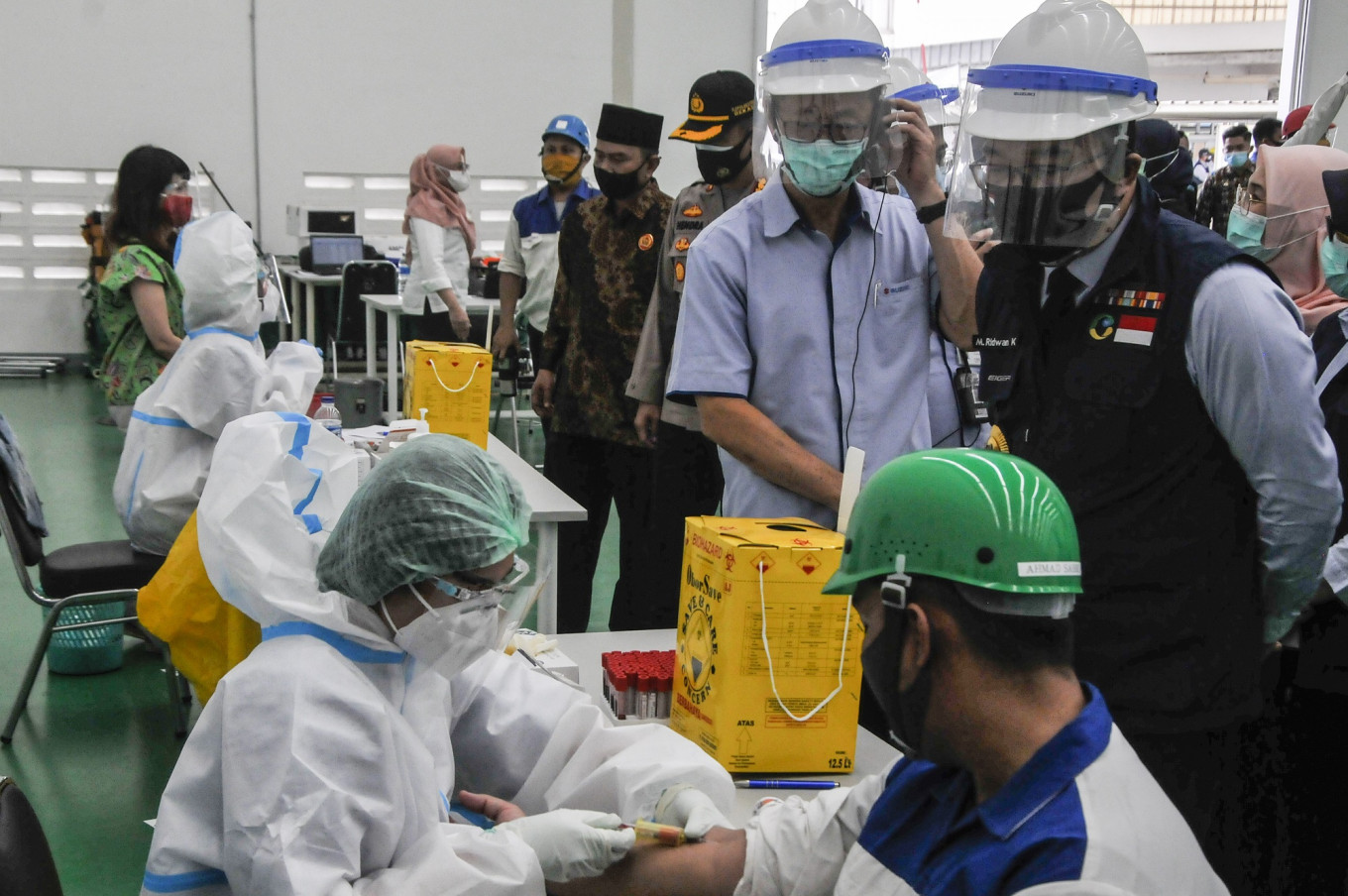Popular Reads
Top Results
Can't find what you're looking for?
View all search resultsPopular Reads
Top Results
Can't find what you're looking for?
View all search resultsCOVID-19 haunts industrial zones in Indonesia
Most clusters found in large companies applying strict health protocols
Change text size
Gift Premium Articles
to Anyone
S
ix months into the pandemic, Indonesian workers are not only at risk of massive layoffs but also of infections at their workplaces, as virus clusters have emerged in factories, prompting calls for tighter government supervision and better compliance of health protocols from companies.
The country’s most populous province, West Java, has seen at least three big clusters with a total of 541 cases emerging from its industrial areas in Bekasi regency, located at the periphery of the capital, within the last weeks of August.
The regency's health agency head, Sri Enny Mainarti, declined to disclose the names of the three factories but said each had 250, 220 and 71 cases, respectively. Another factory had earlier seen dozens of cases in July and another one in May.
They were LG Electronics, motorcycle manufacturer Suzuki and automotive spare part manufacturer PT Nippon Oilseal Kogyu, while previous clusters were also reported from Unilever Indonesia and Japanese industrial conglomerate Hitachi Ltd.
In total, Enny said 22 factories in the regency had reported COVID-19 cases among their workers since the beginning of the pandemic.
In Tangerang, Banten, Mayor Arief Wismansyah told the Post that the administration had traced a total of 43 cases in a cluster emerging from a factory producing daily products from July to August. He also declined to disclose the company names.
Local administration officials have said that the affected factory workers did not only live in the areas where the industrial zones were located but also commuted from areas in Greater Jakarta.
Central Java and East Java have also reported clusters among their workers, amounting to some 300 cases in at least three companies in July for the former and more than 100 cases in two cigarette factories in April and May.
Read also: Sampoerna factory closes after two COVID-19 deaths
COVID-19 Response and Economic Recovery Committee Erick Thohir said during a press briefing last week that factory owners must help curb transmission by following health protocols instead of relying solely on the government, which he said had provided assistance by wage subsidies, tests and health protocol campaigns.
"If [factory owners] don't protect their workers, [choosing to apply] one shift [in a day] instead of two just to pursue [more] income, then [companies must] be ready for the consequences. It's not impossible for the factories to be closed," he said.
Inter-Factory Laborers Federation (FBLP) chairwoman Jumisih said there were still companies that did not provide the necessary facilities for workers to follow health protocols, especially in terms of social distancing. Hence, it was inevitable that thousands or hundreds of workers would come across each other when entering or exiting their workplaces, or during break time.
Some factories had yet to divide shifts and even then, workers were concerned that if they did, their companies would cut their pay according to their working hours, she said, adding that her federation was collecting data on workers who failed to pay their rent due to the pay cuts. Jumisih urged for tighter monitoring from manpower agencies.
"There are workers who only receive half or a third of their income. Who can survive with that money? We need the government's intervention in this. Workers who are afraid of coming to work are afraid of being laid off and can't bring food to the table, but those who come and are at risk of infection also face pay cuts and can't provide for themselves and their families," she said.
West Java Governor Ridwan Kamil visited an industrial area in Cikarang, Bekasi, on Friday, urging companies to facilitate workers to follow protocols, such as by providing good air ventilation. He said that if a local cluster emerged, factories must let their employees in exposed locations work from home.
“Every factory worker is required to fill out a journal every morning detailing their activities outside of the factory, as well as a list of everywhere they go outside of the factory,” Ridwan said.
Enny of Bekasi's health agency said transmissions could occur at smoking area or food stalls outside factory complexes after working hours.
Read also: Indonesia’s factory activity in deepest-ever contraction as pandemic disrupts supply, demand
Indonesian Employers Association (Apindo) property and economic zone head Sanny Iskandar said companies had followed health protocols and regulations, with some carrying out massive testing using rapid antibody tests, which should be seen positively.
Given that most cities and regencies have relaxed lockdown restrictions, companies would have no idea where workers could spend after-work hours, he said, emphasizing that it took everyone to work together in improving the country's economy and maintaining safe workplaces.
"Factories [affected] are large companies that have the money to test their workers. They provide food in canteens. But factories outside these [industrial] areas, their workers eat outside. So, I'm not sure with these companies; maybe it's just because they don't test so they don't find any cases," he said.
"There must be monitoring because it's better to prevent rather than take reactive actions after workers are infected.”










